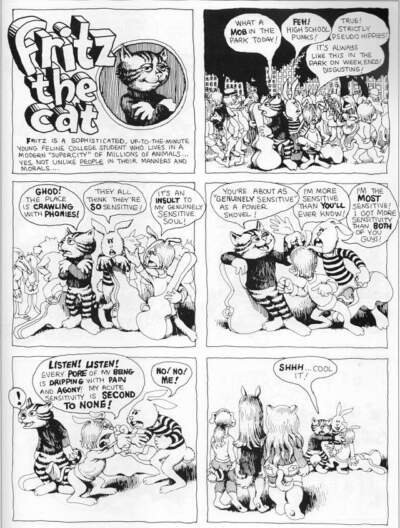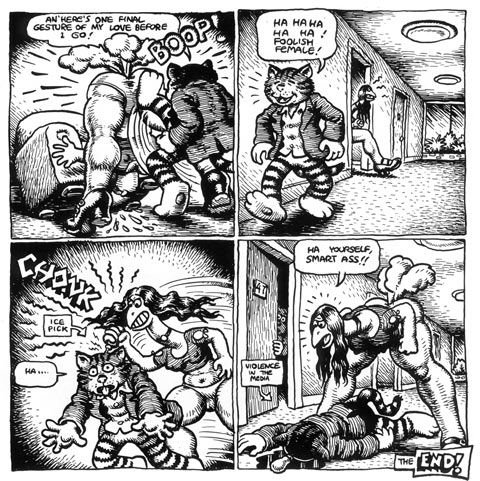Writer and Artist: Robert Crumb
Publisher : Fantagraphics Books
Year : 2017
Anthropomorphic animals, that is, the idea of giving other creatures the same (or some of the) features of human beings goes back to the dawn of human culture. There is a plethora of characters from ancient Greece. Take Aesop and his many a tale of animals which, embodying any given vice of virtue that is part of our race, serve the purpose of teaching us a lesson, whether it be that one needs to be good but not gullible, or that boasting is never a good thing (this is something regarding a fox and a bird, if I’m not mistaken).
Each animal therefore comes to embodying an archetype, foxes being cunning, lions being virtuous, and so on. It might tell us something about ourselves, then, that we make humans out of animals: is it because we are too afraid to look at ourselves naked in the mirror, or is it because we need more than just an ounce of imagination to be taught a lesson?

Anthropomorphic as he is, Fritz is a cat that embodies more than just vices or virtues. He is not, nor could he ever be, a symbol in itself, awful as his actions are. It is not just what he is on the pages that matters, rather what he can be as a regeneration of the world of comic book, a regeneration that does not try to make old trees grow young again, rather new ones being given a chance to blossom.
If there is a necessity for novelty, this must be seen as that of simply walking on uncharted grounds, entering a territory that should not be simply taken as the artist’s need to break the mould of the past, rather as the expression of a mind that is left free to write and draw whatever it wants.
Once censorship is taken out of the equation, then, what is it that is left for us to watch, digest and talk about?

Fritz is, because of this, more than meets the eye, a character born to be the representation of a culture that was striving to find its own voice, although the words that were to be uttered had not yet realised what they were supposed to say. This lack of a clear structure becomes, against what common sense might lead us to think, one of the greatest strengths of the book: what Fritz is, his persona when contextualized in a culture and a society he lives in, can change fluidly, whereas who Fritz is, his inner monologue (the mould he came out of), does not seem to change, as if the character has a life of his own that cannot be got rid of so easily.
Fritz is an awful cat, a creature we cannot but despise for his lack of morality or, better said, for being incapable of functioning as a normal citizen. He is the symptomatic question of what we are made of, as a society, and whether we all can (as we should) give something back to the world surrounding us. Here, then, is where the joy of reading Fritz’ escapades breaks into our most profound psyche: we love Fritz because (a) Crumb knows how to structure a tale and (b) because the main character is never so awful as to become unbearable.
Walking dangerously on the border that turns vice into ugliness, cult writer and artist Robert Crumb manages to breathe into his character a life that we all would not want to live, yet, we are all more than ready to look at just to see where this is all going to end up.
There is, then, a web of citations that work both as in relation to the culture the stories were produced in and the charismatic figure Fritz had become thanks to his foray into the world of cinema. Mr Crumb did not like the result, his cat becoming too different (but, let us ask this question : really?) from his original idea. Borders are blown up, barriers are taken down, and the not too long life of Fritz is brought to a very abrupt end by his creator. Meta-literature, as in a play between the world we live in and the world Fritz walks (and has sex, drinks and takes drugs) in.
A very silent farewell, in the best kind of tradition that only boredom with (because of) a character can give us; goodbye, then, Fritz, as the last page closes on you. You will be sorely missed, having started your career with incest (the sister, abandoned by her creator, is never to be seen again). Thanks for all you did for (or, maybe, to) us.

